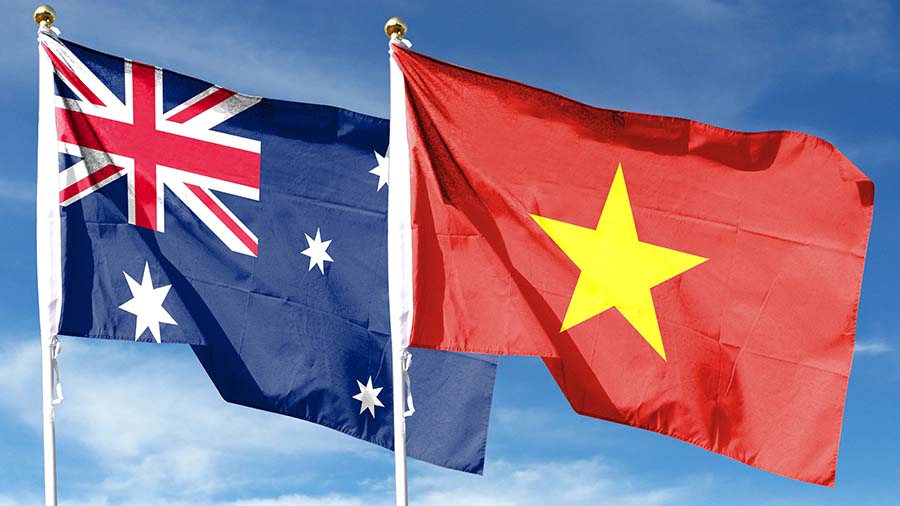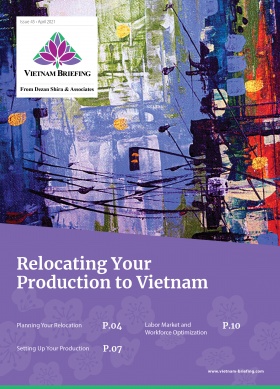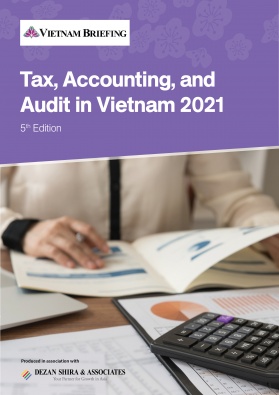US Vice President Visit Underlines Growing US-Vietnam Ties
US Vice-President Kamala Harris touched down in Hanoi on August 24 after a three-hour delay from Singapore as part of her Southeast Asia tour. The aim of the trip was to build relations and upgrade their bilateral relationship to a strategic partnership. Harris’ visit was historic – the first time a US vice president has visited Vietnam since the end of the war
Harris referenced the progress telling Vietnam’s president, that ‘our relationship has come a long way in a quarter of a century.”
For the US the focus has been on developing US ties in the region to counter China.
Trade relations between the US and Vietnam have been strong despite the pandemic and likely accounts for the reasons behind Harris’ visit. The level of US imports from Vietnam was much higher than even in relation to Singapore, reaching a record high of US$84 billion in 2020, up from roughly US$70 billion in the preceding year. The vast bulk of imports are made up of electrical and mechanical machinery, but also household furniture and bedding. The US has become Vietnam’s second-largest trading partner and its top export market worldwide.
Not only this, the growing relationship has resulted in nearly 30,000 Vietnamese students studying in the US contributing nearly US$1billion to the US economy.
We highlight key points from Harris’ trip to Vietnam.
Key highlights of US Vice President visit
COVID-19: The US pledged to donate 1 million COVID-19 Pfizer vaccines to Vietnam bring the total donation to 6 million. As the pandemic rages, the US has also launched a regional Center for Disease Control and Prevention (CDC) office in Hanoi to enhance health security cooperation. The new CDC office will support Vietnam and other countries in the region with public health issues and future pandemics.
Through USAID and the CDC an additional US$23 million in technical assistance is made available to Vietnam. These will help in distributing vaccines and strengthen Vietnam’s health system to combat the pandemic. US’ Department of Defense also committed to provide 77 temperature vaccine freezers for vaccine distribution throughout the country. Harris also thanked Vietnam for its donation of masks and personal protective gear in early 2020 when the US needed them.
Climate change: The US and Vietnam agreed to deal with climate change, increasing resilience and contributing towards a clean energy future. USAID and the Vietnam Chamber of Commerce and Industry (VCCI) signed an MoU on boosting Vietnam’s competitiveness and expanding opportunities for US companies in the field. The MoU will focus on green technology and climate change.
In addition, the US government announced the Vietnam Low Emission Energy Program II (V-LEEP II) – a five-year, US$36 million USAID project to accelerate Vietnam’s transition to a clear market driven energy system. The project aims to increase the adoption of electric motorbikes and implement the Direct Power Purchase Agreement (DPPA) mechanism to allow businesses to buy electricity directly from private firms producing renewable energy.
The US government also launched the Mekong Coastal Habitat Conservation project – a US$2.9 million project – to protect the Mekong Delta and allowing for sustainable fisheries, climate change adoption, and biodiversity conservation
Market access and development assistance: Harris emphasized the government’s efforts to promote economic growth and opportunity by promoting women and ethnic-minority-owned enterprises as well as support for Vietnam’s transition to a digital economy. This was showcased by a US$2 million USAID project to transition from a labor-intensive low-skilled industry to a global digital economy.
Tariffs: US farmers and pork producers to have greater access to the Vietnamese market. Tariff cuts on corn, wheat, and pork products helping US farmers to sell to Vietnam while also reducing the US trade deficit with Vietnam.
Human rights: The US government has put human rights at the center of foreign policy and Harris emphasized the important role civil society plays in global development.
Security cooperation: the US supports Vietnam’s enhancement of its maritime security law and enforcement capabilities
Higher education: USAID announced a Partnership for Higher Education Reform, a five-year project that provides US$14.2 million to build up teaching, research, innovation and governance for three largest universities in Vietnam.
US-Vietnam bilateral relationship
Harris and Vietnamese leaders reaffirmed the strength of the US-Vietnam comprehensive partnership by the opening of a Peace Corps office in Hanoi as well as the construction of a new US embassy in Hanoi. The two leaders agreed that Vietnam and the US have many common points and large room for further cooperation in areas such as economics-trade-investment, security-defense, addressing war legacies, healthcare, education, science and technology.
Harris visit underlines positive and strengthening US-Vietnam ties
The US-Vietnam relationship has been on an upward trajectory in recent years but not without its ups and downs. Former US President Donald Trump had signaled the possibility of tariffs in 2019; while this didn’t happen, the US did pose duties on steel imports from Vietnam. Last year, the US treasury also labelled Vietnam a currency manipulator prompting concerns about possible tariffs, however the US reached a agreement with Vietnam, without no penalties imposed on the country. This implies that the US knows the importance of its relationship with Vietnam as well as the economic ties that could have been hampered.
Further, Vietnam has emerged as an effect China plus one location. While the present COVID-19 outbreak has proved challenging for Vietnam and many have delayed moving production from China, long-term investments remain on track. In addition, investors remain bullish on Vietnam with several US businesses already shifted operations to Vietnam.
All these factors will ensure that Vietnam remains competitive provided it can control the latest outbreak and keeps supply chains moving in the long term. The US-Vietnam relationship will continue to remain effective as reflected by Harris’ latest visit.
About Us
Vietnam Briefing is produced by Dezan Shira & Associates. The firm assists foreign investors throughout Asia from offices across the world, including in Hanoi, Ho Chi Minh City, and Da Nang. Readers may write to vietnam@dezshira.com for more support on doing business in Vietnam.
We also maintain offices or have alliance partners assisting foreign investors in Indonesia, India, Singapore, The Philippines, Malaysia, Thailand, Italy, Germany, and the United States, in addition to practices in Bangladesh and Russia.
- Previous Article Opportunities in Vietnam’s Northern Key Economic Region
- Next Article Vietnam and Bangladesh: Bilateral Trade and Investment































